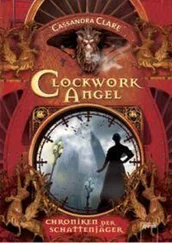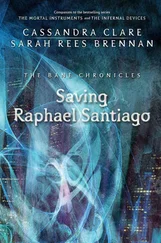It was quite heartbreaking, but I know the Law, and could tell her only that her brother was well and wished to know that they were safe. At that she became angry and opined that Will could best ensure his family’s safety by returning to them. She also said that it was not the death of her sister (did you know of this sister?) that had undone her father, but rather Will’s desertion. I shall leave it up to your discretion whether to pass this on to young Master Herondale, as it seems news that would do more harm than good.
When I spoke to her of Mortmain, she chatted easily to me of him—a family friend, she said, who had stepped in to offer them this home when they had nothing. As she spoke, I began to get a sense of how Mortmain thinks. He knows it is against the Law for Nephilim to interfere with Shadowhunters who have chosen to leave the Clave, and that therefore Ravenscar Manor would be avoided; he knows also that the Herondales’ occupancy of it makes the objects in it theirs, and therefore none can be used to track him. And last, he knows that power over the Herondales could translate into power over Will. Does he require power over Will? Not now perhaps, but there may be a time when he desires it, and when he does, it will be to hand. He is a well-prepared man, and men such as that are dangerous.
Were I you, and I am not, I would reassure Master Will that his family is safe and I am watching them; avoid speaking to him of Mortmain until I can gather more information. As far as I can glean from Cecily, the Herondales do not know where Mortmain is. She said that he was in Shanghai, and on occasion they receive correspondence from his company there, all stamped with peculiar stamps. It is my understanding, however, that the Shanghai Institute believes him not to be there.
I told Miss Herondale that her brother missed her; it seemed the least I could do. She appeared gratified. I shall remain in this area a good while longer, I think; I have become myself curious as to how the misfortunes of the Herondales are entwined with Mortmain’s plans. There are still secrets to be unearthed here beneath the peaceful green of the Yorkshire countryside, and I aim to discover them.
—Ragnor Fell
Charlotte read the letter over twice, to commit its details to memory, and then, having folded it small, cast it into the drawing room fire. She stood wearily, leaning against the mantel, watching as the flame ate away the paper in lines of black and gold.
She was not sure if she was surprised, or disturbed, or simply made bone-weary by the contents of the letter. Trying to find Mortmain was like reaching to swat a spider, only to realize that you were helplessly entangled in the sticky strands of its web. And Will—she hated to speak of this with him. She looked into the fire with unseeing eyes. Sometimes she thought Will had been sent to her by the Angel specifically to try her patience. He was bitter, he had a tongue like the lash of a whip, and he met her every attempt to show him love and affection with venom or contempt. And still, when she looked at him, she saw the boy he’d been at twelve, curled in the corner of his bedroom with his hands over his ears as his parents called his name from the steps below, entreating him to come out, to come back to them.
She had knelt beside him after the Herondales had gone away. She remembered him lifting his face to her—small and white and set, with those blue eyes and dark lashes; he’d been as pretty as a girl then, thin and delicate, before he had thrown himself into Shadowhunter training with such single-mindedness that within two years all that delicacy had been gone, covered over by muscle and scars and Marks. She’d taken his hand then, and he’d let it lie in hers like a dead thing. He’d bitten his lower lip, though he didn’t appear to have noticed, and blood covered his chin and dripped onto his shirt. Charlotte, you’ll tell me, won’t you? You’ll tell me if anything happens to them?
Will, I can’t—
I know the Law. I just want to know if they live. His eyes had pleaded with her. Charlotte, please . . .
“Charlotte?”
She looked up from the fire. Jem stood in the doorway of the drawing room. Charlotte, still half-caught in the web of the past, blinked at him. When he had first arrived from Shanghai, his hair and eyes had been as black as ink. Over time they had silvered, like copper oxidizing to verdigris, as the drugs had worked their way through his blood, changing him, killing him slowly.
“James,” she said. “It’s late, isn’t it?”
“Eleven o’clock.” He put his head to the side, studying her. “Are you all right? You look as if your peace of mind has been rather cut up.”
“No, I just—” She gestured vaguely. “It is all this business with Mortmain.”
“I have a question,” Jem said, moving farther into the drawing room and lowering his voice. “Not wholly unrelated. Gabriel said something today, during training—”
“You were there?”
He shook his head. “Sophie told it to me. She didn’t like to carry tales, but she was troubled, and I can’t blame her. Gabriel asserted that his uncle had committed suicide and that his mother had died of grief because—well, because of your father.”
“My father?” Charlotte said blankly.
“Apparently Gabriel’s uncle, Silas, committed some infraction of the Law, and your father discovered it. Your father went to the Clave. The uncle killed himself out of shame, and Mrs. Lightwood died of grief. According to Gabriel, ‘The Fairchilds don’t care about anyone but themselves and the Law.’”
“And you are telling me this because . . . ?”
“I wondered if it was true,” said Jem. “And if it is, perhaps it might be useful to communicate to the Consul that Benedict’s motive for wanting the Institute is revenge, not selfless desire to see it run better.”
“It’s not true. It can’t be.” Charlotte shook her head. “Silas Lightwood did kill himself—because he was in love with his parabatai —but not because my father told the Clave about it. The first the Clave knew of it was from Silas’s suicide note. In fact, Silas’s father asked my father for help in writing Silas’s eulogy. Does that sound like a man who blamed my father for his son’s death?”
Jem’s eyes darkened. “That’s interesting.”
“Do you think Gabriel’s simply being nasty, or do you think his father lied to him to—”
Charlotte never finished her sentence. Jem doubled up suddenly, as if he had been punched in the stomach, with a fit of coughing so severe that his thin shoulders shook. A spray of red blood spattered the sleeve of his jacket as he raised his arm to cover his face.
“Jem—” Charlotte started forward with her arms out, but he staggered upright and away from her, holding his hand out as if to ward her off.
“I’m all right,” he gasped. “I’m fine.” He wiped blood from his face with the sleeve of his jacket. “Please, Charlotte,” he added in a defeated voice as she moved toward him. “Don’t.”
Charlotte stopped herself, her heart aching. “Is there nothing—”
“You know there’s nothing.” He lowered his arm, the blood on his sleeve like an accusation, and gave her the sweetest smile. “Dear Charlotte,” he said. “You have always been like the best sort of older sister I could have hoped for. You do know that, don’t you?”
Charlotte just looked at him, openmouthed. It sounded so much like a good-bye, she could not bear to reply. He turned with his usual light tread and made his way out of the room. She watched him go, telling herself it meant nothing, that he was no worse than he had been, that he still had time. She loved Jem, as she loved Will—as she could not help loving them all—and the thought of losing him shattered her heart. Not only for her own loss, but for Will’s. If Jem died, she could not help but feel, he would take all that was still human about Will with him when he went.
Читать дальше











